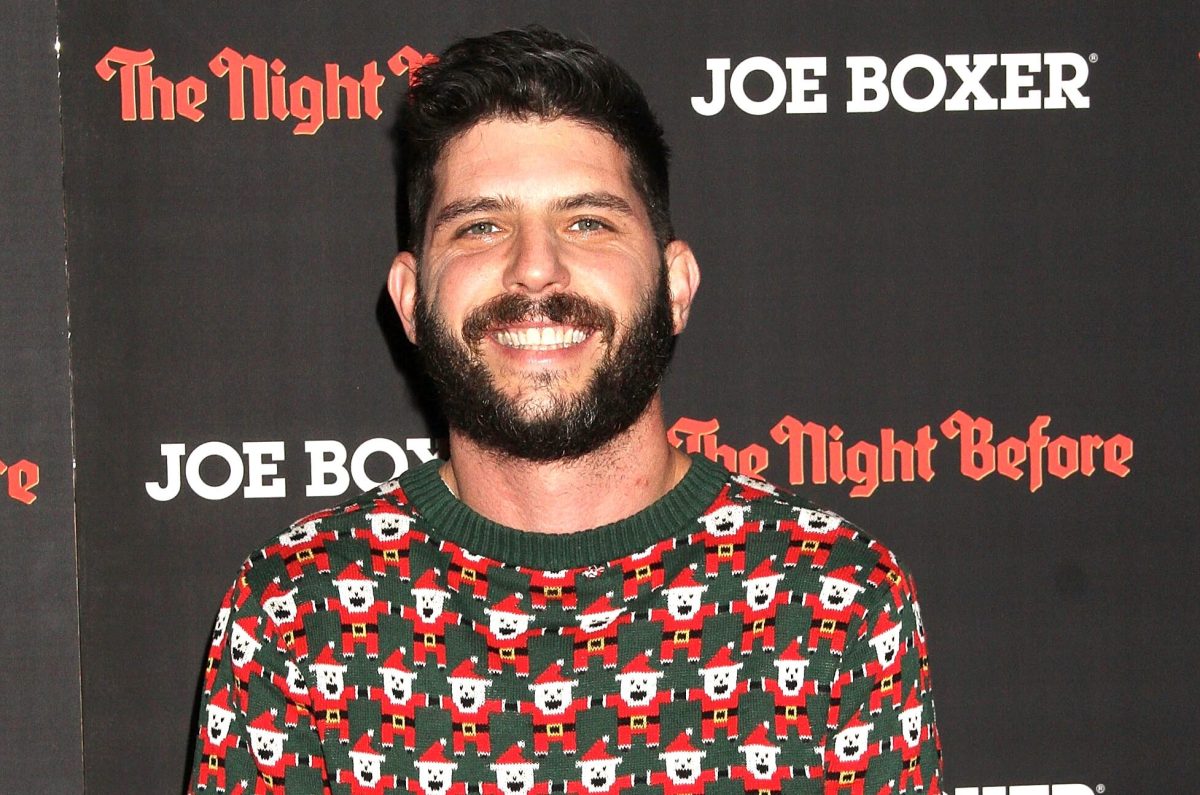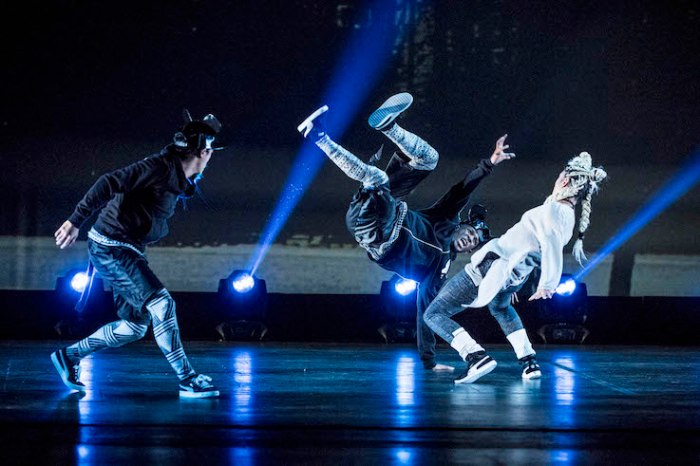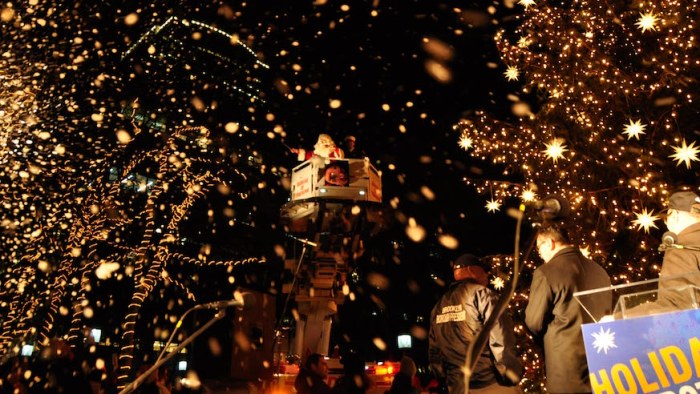The last time director Jonathan Levine made a movie with Joseph Gordon-Levitt and Seth Rogen, it was “50/50,” a dramedy about cancer. “The Night Before” is more lighthearted — sort of. It follows three friends (the other played by Anthony Mackie) doing their annual tradition of having a sloppy night in NYC on Christmas Eve. But this time the characters played by Rogen and Mackie feel they’re too old and settled down to ever do it again, leaving Gordon-Levitt as the last hold-out. It’s that anxiety that made Levine — who also made “The Wackness” and “Warm Bodies” — comfortable doing his first full-on comedy. This is your second film with Seth Rogen, after “50/50.” How did you two first meet?
On “50/50,” there was another filmmaker who dropped out a couple months before. I was one of five people up for the gig. For whatever reason they liked me. I think it was because I made “The Wackness” and they thought I would smoke weed with them. [Laughs] But it was also because I spoke relatively intelligently about the material. RELATED: Ilana Glazer talks “The Night Before” and how Season 3 of “Broad City” will be “more real” I’ve read you two have helped each other out on projects — that he helped look at “Warm Bodies” and you looked at “This is the End.”
Yeah, but it wasn’t in any specific way. Seth and Evan continuously have people come in and look at their stuff. If I’m looking at “This is the End,” I’m one of 50 people who are looking at it. On “Warm Bodies” I definitely used that. The first time was on “50/50,” where we thought we needed to have smart people look at it and tell us what’s good and what’s bad. Seth was one o those people. It’s a culture of rigorous note-giving and improving the work. You’ve done dramas or romances that were funny before, but you’ve never really made a full-on comedy.
It was a change of pace. And it certainly wouldn’t have worked for me if at its heart there wasn’t an undercurrent of drama. Having it fundamentally revolve around issues of friendship and getting older, that me more comfortable executing the comedy. I loved doing something whose primary goal was to make people laugh. You feel like you’re throwing a party and your only goal is to make everyone has as much fun as possible. Your sets sound very loose. You’re not like Sam Peckinpah, drunkenly screaming at people.
No one screams at anybody. Well, I probably screamed on occasion. But generally everyone can bring their friend, everyone can brings their mom, everyone’s welcome. When there’s a very serious scene, of course it’s not like that. It’s very subdued. But if you were to see it it would look like we’re having fun. Despite all the crazy things that happen in the film, it is, as you said, rooted in a serious concern. Joseph Gordon-Levitt’s Ethan is someone who hasn’t gotten his stuff together, while his closest friends have, causing a disconnect. When we were writing it, every single person had someone in mind who was that person in their life. We talked about why that person was not succeeding. There were many reasons. For a lot of us, the reason we’ve succeeded is talent, but also a lot of luck, so it’s s—ty to look at the friend who hasn’t been so lucky. But the truth is a lot of it is luck. We settled on giving [Ethan] a trauma he’s never been able to move past. That happens to a lot of people, whether it’s someone who got stuck in a job for too long and looked up one day and his friends were more successful than him or her, or someone just got knocked down and took too long getting back up. Obviously it’s in the context of a comedy, but you want to ground it. How conscious were you of playing with holiday movie conventions?
I imagined it as a Christmas movie for people who didn’t celebrate traditional Christmases, whether because you’re Jewish or from another non-Christian religion or your parents are divorced or you hate your parents. There are lot of people who feel left out of the traditional Christmas. I would go out in New York do stuff like this on Christmas Eve. There were a lot of Christian people, there were a lot of Jews. It was all people who had a reason for not celebrating the traditional Christmas. It’s nice because Christmas is an oppressive, monolithic thing. I’ve always loved it, but I didn’t think it was quite for me. RELATED: Anthony Mackie on “Shelter,” homelessness and that pro-Trump misquote Christmas has been slowly moving away from being a strictly religious, Christian holiday and becoming more open and accepting.
Which I think is really awesome. I love communal experiences in general, and any communal experience that’s about being kind to your fellow man and celebrating and being festive, I’m going to be on board with that. I love the music and I love the movies. I just happen to not be of the religion that’s being celebrated. You’ve spoken about your passion for Hal Ashby movies. How does the Ashby influence come to play in a movie like this?
It’s funny, this film is devotedly non-pretentious, so referencing Hal Ashby is a little weird for me. But of course I have a lot of very pretentious references for this movie, including “Eyes Wide Shut” and “25th Hour.” But [Ashby’s] “The Last Detail” is a big one for this one, because it’s about three guys, and there’s an emotional thing hanging over them the entire time. There’s also his ability to find humor in dramatic moments and drama in humorous something, which I’ve always admired. I’m always trying to capture that. One last question: There’s a scene where they go to a department store and jump around on a giant piano, a la Tom Hanks and Robert Loggia in “Big.” The store isn’t identified, but it’s implied it’s FAO Schwarz, which has since closed in its original, iconic location off of Central Park. You didn’t actually shoot there before it shuttered, did you? No, we didn’t. I think technically we’re not even allowed to call it FAO Schwarz. They weren’t comfortable with some of the scenes in our film, so they didn’t approve us. But by the way, the piano wasn’t even there last year. It was some tiny version of it that would have killed the joke for us. We found a dude who had a piano and I bought it on an auction. We just built it on the set. But now [FAO Schwarz] is gone. That’s a lot of what the movie’s about. There you go, brought it back around.
Jonathan Levine on ‘The Night Before’ and Christmas being for everyone

Getty Images
Follow Matt Prigge on Twitter @mattprigge


















